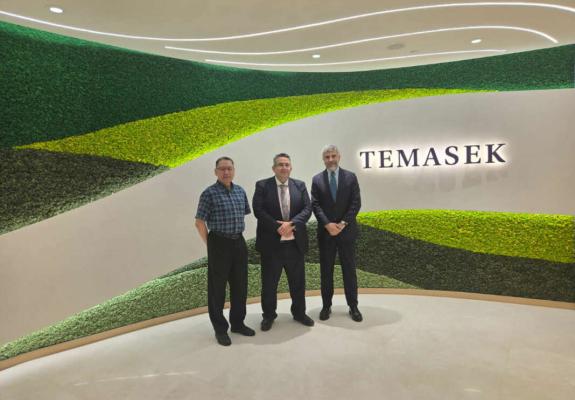Quelling Climate and Water Scarcity Concerns With Technology
Concocting a perfect response to an argument from five days ago while enjoying a warm shower is an unrivaled comfort zone many of us have experienced. However, we may likely not give much thought to the amount of water we are using, and the privilege it is to have access to that clean, warm water. A recent Netflix documentary, Brave Blue World, accurately sets the tone on the scarcity of water and the need for building a future that includes sustainable use and reuse of water.
Throughout the documentary, viewers are walked through various innovations around the world that are committed to combating water scarcity. One innovation from the NASA research center shows how water is recycled in space. Another, in Spain, highlights the success of the world’s most immense algae-powered wastewater treatment plant.
The need for these innovations are clear, as we witnessed one of the worst droughts in Italy’s recorded history this year, having a ruinous impact on 83,000 agricultural businesses. The Central US also experienced frightening droughts in 2023, raising the need for climate change solutions.
Innovations in water reuse, retention, and maintenance are crucial in a world that is increasingly getting warmer. NASA shows that global land and ocean temperatures have been increasing drastically, especially across the past 40 years. But if it is expected that temperatures around the world are rising, these innovations may fall short of protecting our planet’s most valuable resource.
There are, however, innovations in climate change mitigation and adaptation. Climate change mitigation is a method of reducing or preventing greenhouse gas emissions, which largely contribute to rising temperatures globally.
Climate change adaptation refers to processes of adjusting to current or forecasted effects brought by climate change. Making this distinction is important as technological innovations in these spaces serve different purposes, but are overall aligned in protecting the planet and humans from natural disasters.
Climate change mitigation and adaptation technologies are considered to be green technologies, a market that is currently standing at $61 billion, and is projected to rise to $417 billion by 2030. Global efforts dedicated to minimizing harm to the environment, promoting renewable energy, and helping develop sustainable practices.
One recent example, considered by the European Union, the United States, and the United Nations, is a geoengineering effort to block out the sun. As far-fetched and bizarre as it sounds, it could work, but do come with inherent risks. One plan is to send 125 jets to spray particles in the atmosphere that would drift towards the poles, potentially cooling the earth by 2 degrees Celsius.
This also aligns with another geoengineering strategy which similarly looks to employ the strategy of setting particles in the atmosphere. However, these solutions are only temporary, as the key solution lies in reducing emissions and solving resource scarcity concerns.
As temperatures rise, countries around the world are racing to develop systems and products to quell the severity of the impact of climate change. Cyprus is among the 25 EU member states dedicated to practicing adaptation and mitigation to climate change, and signed an EU Charter which aims to support countries in enhancing their transformation towards a more resilient climate by 2030.
In recent years, Cyprus has been grappling with the intensifying effects of extreme weather events, a consequence of climate change. Rising temperatures, periodic droughts, and erratic rainfall patterns are taking a toll on Cyprus' environment, and may impact its economy if no action is taken.
Cyprus’ national low greenhouse gas (GHG) emission development strategy clearly outlines the need for innovative climate change mitigation and adaptation technologies. The strategy notes “the selected sectors of importance in which climate change is significant for Cyprus are the following: Water resources, Agriculture, Coastal zones, Tourism, Biodiversity, Energy, Fisheries and Aquaculture, Soils, Forests, Public Health and Infrastructure.”
Amid these challenges, several initiatives have emerged as beacons of hope, offering innovative and sustainable approaches to mitigate and adapt to the impact of these climatic upheavals.
University of Cyprus’ KIOS Research and Innovation Center of Excellence, since 2020, has engaged in an initiative known as Smart Water 2020 to optimize the use and management of water networks. This is a crucial initiative, as an estimated 15-25% of drinking water in Europe is lost through leaks and other damages, creating severe challenges for isolated European member states in having access to clean water. As water desalination costs are high, harvesting clean water from the Mediterranean is not an effective solution.
In this sense, installing smart technologies such as sensors and valves in water supply systems to better monitor water management is a strong response to the needs of sustainable and well-managed water resources listed in the country’s low GHG emission development strategy.
Regarding adaptation strategies, The Cyprus Institute (CyI) has taken initiative in establishing its Department of Energy’s Sustainable Built Environment group (SBE) to tackle climate change impacts. The SBE group is focused on developing and deploying climate adaptation and mitigation strategies in urban areas within the Eastern Mediterranean and the Middle East.
In a discussion with Fadi Comair, Director of the CyIs Energy, Environment, and Water Research Center (EEWRC), he shared some further efforts made in bringing leaders together to educate on and promote innovative solutions to water scarcity and climate concerns. “CyI is currently in the process of launching the educational arm of the Hydro diplomacy Partnership Program (HPP) and more specifically a Water Diplomat course.
The course is designed to strengthen capacities of leaders in the EMME region through access to state-of-the-art knowledge and opportunities, as well as to educate and build the capacity of both technical and non-technical participants with relation to transboundary water. This unique learning experience takes course over a three week period, one intensive week, or a short three-day interdisciplinary training.”
The presence of educators and leaders in Cyprus in hydro diplomacy, as well as other core environmental-intensive matters, is reassuring that efforts are being made to be relevant and included in creating solutions, establishing Cyprus as a key entity in combating climate crises.
Technologies allow the SBE group to simulate thermal and energy behaviors of buildings to lessen GHG emissions in order to create and assimilate optimal adaptation strategies. Conducting such research is crucial as an estimated 56% of today’s population worldwide resides in urban areas, and is expected to double by 2050.
Considering the government of Cyprus’ involvement in the EU’s targets to decrease GHG emissions through the implementation of adaptation and mitigation technologies, it is likely that the island will see further initiatives taking place. However, an interesting point to note is that climate mitigation and adaptation technologies are the least investing in among green technologies.
Renewable energy and energy efficiency technologies are taking the largest slices of the green technology pie. As temperatures globally continue to rise, it is likely that priorities among investors may shift.
By engaging stakeholders, raising awareness, and facilitating capacity-building initiatives, these businesses empower individuals and communities to actively participate in climate action. Education campaigns and workshops ensure that policymakers and the public understand the importance of taking action and adopting climate-friendly practices.
The journey towards climate resilience requires a collective effort, with governments, businesses, communities, and individuals all playing pivotal roles. Climate solutions businesses act as facilitators, bridging the gap between scientific knowledge and practical implementation.
They bring expertise, resources, and a commitment to sustainability, working hand in hand with Cyprus to quell the impacts of extreme weather events and build a resilient future.
As Cyprus embraces the transformative potential of climate solutions businesses, it opens doors to innovation, economic growth, and environmental stewardship. By harnessing the power of renewable energy, optimizing energy efficiency, adapting to changing climatic conditions, and building sustainable systems, Cyprus can participate in creating a future that is better equipped to face the challenges of an evolving climate.






